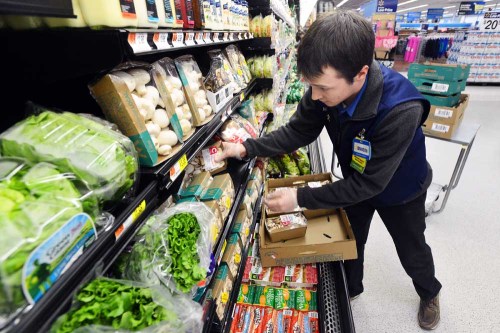MEASURE 103 Grocery tax ban would amend state constitution
Published 2:40 pm Tuesday, October 2, 2018

- Produce manager Brandon Bradley stocks mushrooms on Thursday, February 26, 2015, at the Wal-Mart store in Pendleton.
Oregon has long been known as the “no-sales-tax” state. In November, voters will decide if they want to keep it that way.
Measure 103 proposes a ban on taxing all grocery items within the state of Oregon. The measure, introduced by grocers and marketing executives from the industry, defines groceries as “any raw or processed food or beverage intended for human consumption.” It does not apply to alcohol, marijuana or tobacco, or non-food items like toiletries, medicine or paper products.
A “yes” vote on Measure 103 supports the prohibition of any tax on groceries by state or local governments, and would prevent those taxes from ever being imposed. A “no” vote opposes that prohibition, and would allow state or local governments to impose taxes on grocery items.
The measure, which would amend the state constitution, would apply to any tax on food or beverages (except alcohol) that has been enacted between October of 2017 and the election.
Many local grocers and market managers did not want to comment on the measure. But on the “Yes on 103” official website, several local businesses have officially endorsed the measure. Listed businesses from Umatilla County include the Pendleton Market, J & D’s Food Mart in Pilot Rock and the Hermiston Chamber of Commerce, as well as companies that have stores in the area, such as Safeway.
Dave Meade, the manager of Umatilla’s Columbia Harvest Foods, said it’s a concern for small and large businesses.
“If you’re a border town and your store is located at or near the border, I think if there’s a tax on food, it would cause folks to spend a little more money in the Tri-Cities,” he said.
But he said the bigger concern for him is not the impact on businesses, but on customers.
“For us it’s kind of a pass-through,” he said. “But the main thing is that it would just be problematic for low and middle-income families.”
He said people come from about a 10-mile radius to shop at Columbia Harvest Foods, and many of those customers fall into the low- and middle-income brackets.
“We’re more concerned for our customers,” he said. “Everyone eats. It would be a tax on everyone.”
He noted that even those who get some sort of food assistance, like EBT (electronic benefits transfer) cards, will still be affected by a food tax.
Some large cities around the U.S. have imposed bans on specific items, like soft drinks.
“I think in small municipalities, it’s not a great idea,” he said. “Everyone’s tax burdens are heavy enough as it is.”
Katherine Driessen, the communications director for the “No on 103” campaign, said the measure is much more than a ban on taxes for groceries.
“There is no sales tax on groceries now, and no one is proposing one,” she said. “If that’s all the measure did, prevent a sales tax on groceries, we’d support that.”
Instead, Driessen said the measure provides sweeping exemptions to food and beverages at every stage of production, transportation and sale, while leaving out items that are important to many consumers, like medicines, diapers and feminine products.
“The measure is so broadly written, it includes the whole supply chain,” she said. “A trucking company that carries food to a store or a restaurant […] could argue that they should be exempt from a gas tax.”
Driessen said the biggest concern for those in the “No” campaign is the removal of local control.
For example, she said, Ashland has a restaurant tax. Under Measure 103, they could neither increase nor decrease that tax.
Driessen said those proposing such a major change to the state constitution should be more cautious, as it’s difficult to reverse.
“When we change our constitution, it should be really deliberate, and the policy should be simple and clear, and address an urgent crisis,” she said. “Measure 103 fails to meet all those requirements.”





